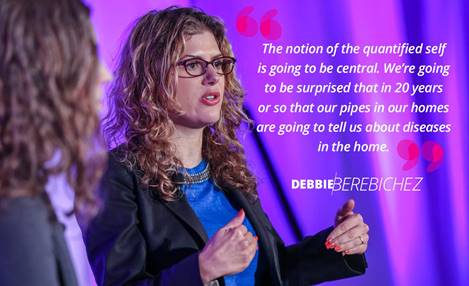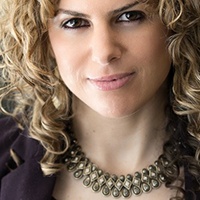
Dr. Berebichez’ is currently the Chief Data Scientist at Metis in NY. At Metis she leads the creation and growth of exceptional data science training opportunities. Her responsibilities include ensuring the excellence of Metis’ data science bootcamps, corporate training, professional development as well as online programs. She is an active contributor to the national data science ecosystem through frequent public speaking and presentations on panels at data science conferences.
Her work in science education and outreach has been recognized by the WSJ, Oprah, Dr. Oz, TED, DLD, WIRED, Ciudad de las Ideas and others. Her passion is to empower young people to learn science and to improve the state of STEM education in the world. She is a John C. Whitehead Fellow at the Foreign Policy Association, a winner of the Society of SHPE’s STAR Award and a recipient for Top Latina Tech Blogger by the Association of Latinos in Social Media LATISM.
Dr. Berebichez completed two postdoctoral fellowships at Columbia University’s Applied Math and Physics Department and at NYU’s Courant Institute for Mathematical Sciences where she carried out research in the area of acoustic waves. She invented a highly effective technique in the field of wireless communications whereby a cell phone user can communicate with a desired target user in a location far away.
VIDEOS
SPEAKING TOPICS
01
Outrageous Acts of Thinking
We are bombarded with many falsehoods about science and technology—pseudoscientific claims, urban legends, misconceptions—disguised as facts while many marvelous truths about the world are ignored or unappreciated. Since we are masters at fooling ourselves, it is easy to convince ourselves that false ideas are reasonable and dismiss true ones as outrageous. Become a more effective critical thinker by learning to distinguish between the true, the false and the just plain weird in the world of science and technology.
02
Changing the World One Equation at a Time
Debbie grew up in a conservative community that discouraged girls from pursuing a career in science, technology or engineering. In high school she was told that if she were too smart, she would never be liked and that it would be better for her to pursue a feminine career. But she wanted to understand how the world works, so she defied her parents and friends and studied physics becoming the first Mexican woman to graduate with a PhD in physics from Stanford. In this presentation, she shares the ups and downs of her path, which led her to becoming a physicist, a TV host of science programs and a mentor to young women who want to become scientists, and shows how all of us all can remove barriers and help young people do science today.
03
Things about the Future and the Future of Things
Our lives are full of things. Alarm clock, shower, coffeemaker, clothes, phone, watch, car, computer, desk, chair—every day we interact with more things than people. If things could talk, they would be our best friends. And soon they will be. Because the things in our lives have started to talk to us, helping us make each day a little better, from the watch that monitors our health to the car that drives itself. This interconnected world—the Internet of Things (IoT)—offers new possibilities for personal growth. It also offers exciting business opportunities and some unique challenges regarding privacy and security. In this talk, Debbie presents the wonderful future that IoT is bringing to us and explains how it will transform every aspect of our lives. She also discusses the important challenges to security and privacy that come with this new reality.
04
Everything You Wanted to Know about Data Science but Were Afraid to Ask
What is data science? What does it mean that big data is transforming our lives? Why is data science the “sexiest job of the 21st century”? This talk provides you and your company a non-technical introduction to data science from basic concepts and techniques to how businesses and governments are using data to find out more about everyone all the time. Debbie also discusses a common problem with data science: many companies are disappointed that their investments in data science are not resulting in increased profits. Debbie explains how restructuring your organization to empower all its employees with data-centered policies can affect the change you need.
05
Customer Loyalty in the Age of Big Data
Customer engagement has entered a new era. We are now moving into an age of personalized marketing and predictive sales. These revolutionary changes are possible because of the advent of fast and reliable tools to aggregate, analyze and act upon customer information. This big data approach will eventually be ubiquitous and the success of companies will depend on how effective they are at reaping the benefits of big data. In this talk Debbie shows how companies can use big data to achieve a superior customer engagement.
06
Statistics and the Art of Deception
Data scientists use statistics to reach meaningful conclusions about data. Unfortunately, statistical tools are often misapplied, resulting in errors that cost both time and money. By being aware of the most common mistakes involving statistics, we can become better and more productive data scientists. To illustrate the kinds of problems that often arise, Debbie presents examples of egregious misuses of statistics in business, technology, science, and the media and analyzes them through a review of basic statistical concepts. She explains how to weed out the most common errors and reduce the chance of being fooled by statistics.
Deborah Berebichez’s Blogs:
- Chief Data Scientist Debbie Berebichez Delivers Keynote at Grace Hopper Conference
- Dr. Deborah Berebichez On Overcoming Barriers To Achievement For Women In STEM in Forbes
- Dr. Deborah Berebichez in Nivel Uno Magazine
- Outrageous Acts of Thinking: The Misuse of Science
- Dr. Deborah Berebichez talks about Science, STEM, Students and Stereotypes in The Sheridan Press


